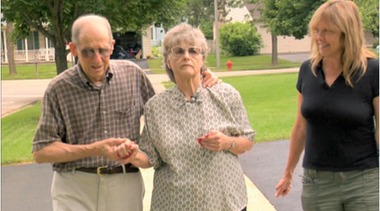SYNOPSIS
A photographer and script supervisor in the film industry, Kim began to experience increasing difficulty with her memory, her emotional stability, her balance and coordination, all of which adversely affected her ability to work and maintain personal relationships.
After visits with numerous neurologists and several months of medical testing, Kim had her diagnosis - Huntington's Disease — an incurable degenerative neurological disorder that is both mentally and physically devastating.
As Kim slowly came to terms with this new reality, she determined to learn as much as possible about her disease and its effects, and to direct a film about that journey. Initially Kim resolved to be only the investigator in the film, but was persuaded that the most powerful way to communicate was through sharing her personal experience.
Through the course of making this documentary, Kim explores her family history, interviewing family members and asking questions about the father she lost to suicide a decade earlier. She speaks with doctors, researchers, fellow Huntington's sufferers and caregivers. She bravely allows us a glimpse into her everyday life, in some of her most vulnerable and emotional moments.
-- Jorjet Harper
A photographer and script supervisor in the film industry, Kim began to experience increasing difficulty with her memory, her emotional stability, her balance and coordination, all of which adversely affected her ability to work and maintain personal relationships.
After visits with numerous neurologists and several months of medical testing, Kim had her diagnosis - Huntington's Disease — an incurable degenerative neurological disorder that is both mentally and physically devastating.
As Kim slowly came to terms with this new reality, she determined to learn as much as possible about her disease and its effects, and to direct a film about that journey. Initially Kim resolved to be only the investigator in the film, but was persuaded that the most powerful way to communicate was through sharing her personal experience.
Through the course of making this documentary, Kim explores her family history, interviewing family members and asking questions about the father she lost to suicide a decade earlier. She speaks with doctors, researchers, fellow Huntington's sufferers and caregivers. She bravely allows us a glimpse into her everyday life, in some of her most vulnerable and emotional moments.
-- Jorjet Harper


